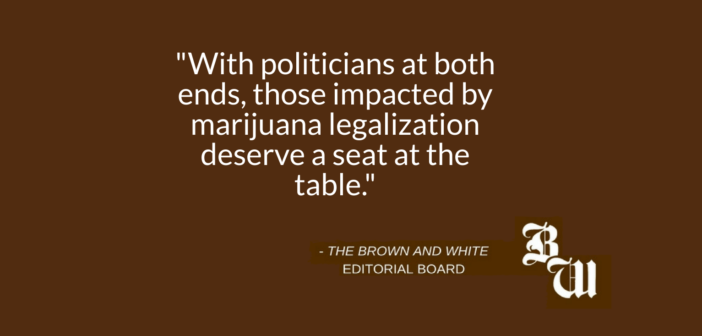The cannabis industry brought in $1 billion in revenue for Colorado in 2018 alone, while Ferrell Scott spent his ninth consecutive year behind prison walls.
Scott, a 56-year-old African American man, sold marijuana in the early 2000s to support his three children. Ten years after his conviction, he watches as marijuana is legalized and sits at the forefront of presidential debates.
Scott was sentenced to life in prison for a non-violent marijuana charge in 2009. As the years have passed, news broadcasts discuss prospective plans to legalize marijuana. Candidates promise to legalize marijuana on the federal level, while Scott watches on his television screen, behind bars.
While political candidates struggle to come to a consensus on the future of marijuana legalization, the freedom of thousands depends on the next steps taken.
Regardless of politicians’ and voters’ varying stances on marijuana legalization, it is critical to recognize the lives and communities at stake if our nation fails to confront the legislation with urgency.
Since the War on Drugs in the 1970s, marijuana has been grouped with other illicit drugs. Former President Ronald Reagan said “marijuana, pot, grass is probably the most dangerous drug in America.” But as the conversation has opened up, researchers have found that this may not be the case.
According to a study by author and sociologist Van Gundy, there is little to no association between marijuana use and the future use of illicit drugs. Due to his findings, Gundy is one of the many researchers urging policy-makers to humanize the marijuana debate and seek justice for those incarcerated.
The cannabis industry is expected to be worth $77 billion by 2022, and it is predominantly controlled by — and benefitting — caucasian CEOs. As of 2017, 81 percent of cannabis executives were white. Meanwhile, African American males are 3.73 times more likely than white males to be incarcerated for marijuana-related offenses.
Of the 60,000 marijuana-related arrests in New York City between 2014 and 2016, 88 percent were black or Latino. Before Americans can ethically profit off of cannabis sales, we must confront past racial discrepancies face-to-face.
The Controlled Substances Act of 1970 classifies marijuana as a Schedule I substance, which labels a drug as abused and of no medical value. This is the same classification as heroin and LSD. In 1971, President Richard Nixon declared the War on Drugs, further classifying marijuana as a threat to public safety.
Separate from federal policies, 11 states have legalized recreational marijuana since 2010. And as politicians begin to promise progressive policies, state and federal laws sit at a crossroads.
2020 candidates sit at both ends of the table. Some candidates commit to complete federal legalization of marijuana while others are in favor of decriminalization, but not federal legalization.
With politicians at both ends, those impacted by marijuana legalization deserve a seat at the table.
Two-thirds of the American population support marijuana legalization. Meanwhile, 663,367 people were arrested for marijuana offenses in 2018.
Scott will spend the rest of his life behind bars as a result of a marijuana-related charge. Meanwhile, mainstream legal cannabis suppliers, such as Acreage, make up to $13 million per year.
Since his incarceration, Scott’s children have grown into adolescence, Scott has watched recreational marijuana gain legalization in 11 states, and CEO of Acreage, Kevin Murphy, profits almost $400,000 per year in cannabis sales.
As politicians debate the topic, stories like Scott’s must remain at the forefront of the discussion. If states continue to legalize marijuana, bringing in billions in revenue, the marijuana-related incarceration of thousands must be revisited.
The glaring hypocrisy between the consequences in the past and progress in the present calls for the humanization of the issue.
For the 10th year, Scott sits in a prison cell, separated from his family, while states and CEOs profit off of the industry.
The legalization of marijuana is more than a state issue — it is a pressing example of the impacts of racial bias in the criminal justice system. Our nation must confront the past before implementing progressive legalization plans.
If convicts like Scott remain behind bars while predominantly white, male CEOs earn millions, we will continue to go nowhere but backward.






Comment policy
Comments posted to The Brown and White website are reviewed by a moderator before being approved. Incendiary speech or harassing language, including comments targeted at individuals, may be deemed unacceptable and not published. Spam and other soliciting will also be declined.
The Brown and White also reserves the right to not publish entirely anonymous comments.